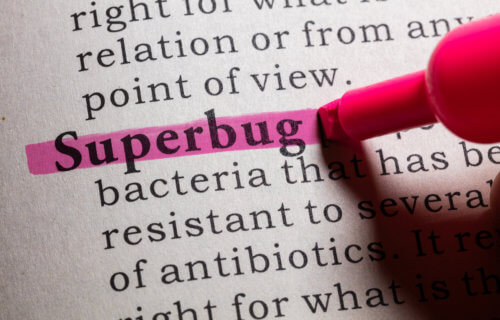BARCELONA, Spain — The golden age of antibiotics is on its way thanks to several gold-based compounds found to have the potential to treat drug-resistant “superbugs.” With researchers in Spain saying 19 of the compounds are effective against at least one hard-to-treat bacterium and some are effective against multiple strains, the future is looking golden.
Drug-resistant infections kill an estimated 700,000 people a year globally and this figure is projected to rise to 10 million by 2050 without new medications. The World Health Organization (WHO) calls antibiotic resistance one of the greatest public health threats facing humanity. However, the development of new antibiotics has stalled and the few new antibiotics being developed are mainly offshoots of existing treatments.
Gold is known to have antibacterial properties, making it an exciting new potential. The gold metalloantibiotics are compounds with a gold ion at their core. According to researchers, they’re inexpensive and straightforward to make.
Which infections can gold stop?
The study investigated 19 gold complexes against a range of multidrug-resistant bacteria. The complexes all belong to the same family but have slightly different structures.
The team studied six bacteria including Methicillin-resistant Staphylococcus aureus, which causes MRSA, Staphylococcus epidermidis, which causes catheter-associated infections, and Pseudomonas aeruginosa, which leads to infections such as pneumonia.
The other three were Stenotrophomonas maltophilia, which can also cause pneumonia, and Acinetobacter baumannii and Escherichia coli that leads to blood and urinary tract infections as well as pneumonia.
All the strains studied were multi-drug resistant. S. aureus, P. aeruginosa, A. baumannii, and E. coli are among the bacteria strains which pose the greatest risk to human health.
Multidrug-resistant S. maltophilia is becoming increasingly common in the lungs of people with cystic fibrosis. In tests, 84 percent of the gold complexes were highly effective against MRSA and S. epidermis. Out of the 19 complexes, 16 were effective against the other bacteria, all of which have greater natural resistance to antibiotics.
How do the golden complexes work?
Gold complexes use a variety of techniques to kill bacteria. They stop enzymes from working, disrupt the function of the bacterial membrane, and damage DNA. Crucially, these new antibiotics should prevent antimicrobial resistance from developing.
“All of the gold compounds were effective against at least one of the bacterial species studied and some displayed potent activity against several multidrug-resistant bacteria,” says study author Dr. Sara Soto González from Barcelona Institute for Global Health in a media release.
“It is particularly exciting to see that some of the gold complexes were effective against MRSA and multidrug-resistant A. baumannii, as there are two biggest causes of hospital-acquired infections.”
“The type of gold complexes we studied, known as gold (III) complexes, are relatively straightforward and inexpensive to make. They can also be easily modified and so provide a vast amount of scope for drug development.”
“With research on other types of gold metalloantibiotics also providing promising results, the future is bright for gold-based antibiotics,” Dr. González concludes.
The researchers are presenting their findings at this year’s European Congress of Clinical Microbiology & Infectious Diseases (ECCMID) in Copenhagen.
South West News Service writer Alice Clifford contributed to this report.


It’s already been established sound frequencies can destroy everything in existence, including bacteria. But it’s not patentable. Opps.